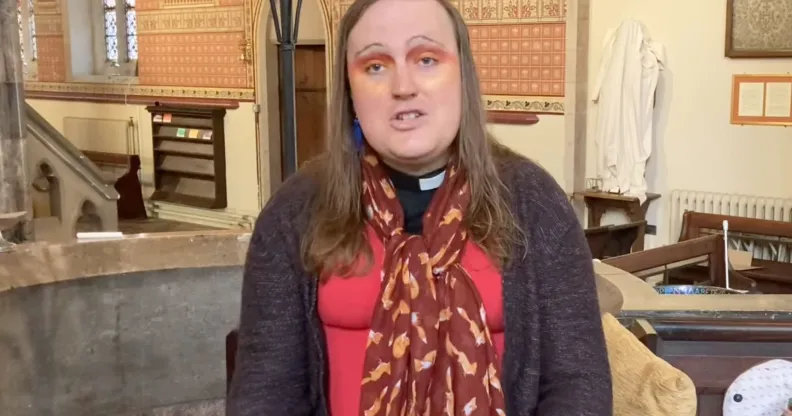Church of England’s first non-binary priest on discovering their gender: ‘I was in a lot of denial’

Genderqueer Church of England priest Bingo Allison said their religious journey completely changed their previously conservative outlook on life. (YouTube/Bingo Allison)
The Church of England’s (C of E) first non-binary priest has opened up about overcoming prejudice and embracing the LGBTQ+ community.
Parent-of-three Bingo Allison spoke about their journey to acceptance and self-discovery in a powerful, wide-ranging interview with the Liverpool Echo.
The priest, who is originally from West Yorkshire, said discovering their gender identity brought them closer to God – and their own journey has forced them to re-evaluate their own position on LGBTQ+ identities.
Allison was brought up in a “strongly religious” household where homosexuality and queerness were viewed as “sinful”, they said.
“Transition and coming out can and should be a spiritual experience, as well as an emotional and social, sometimes physical one,” they said.
“My views used to be very traditional and very conservative. Some might call them bigoted and there was a lot of ignorance and a lot of ‘othering’.
“I didn’t take the time to learn from other people’s experiences. I was definitely in a lot of denial and some of that came out in denial of other people’s identities.”
They started questioning their own stance when someone challenged them for referring to gay marriage as an “issue”. That forced Allison to find a “new way” to view LGBTQ+ people, which helped them to a “different way of thinking”.
‘I properly felt God was guiding me into this new truth about myself’
But it wasn’t until they came across the term “genderqueer” that “everything suddenly clicked”.
The discovery was incredibly difficult to deal with, they said, especially considering they were halfway through a seven-year vicar training programme. They initially considered staying in the closet, but the truth of their identity just couldn’t wait.
“There were lots of times before when I kind of questioned my identity, but growing up in a more conservative form of Christianity meant that it was just so far beyond my imagination.
“It was like another planet to me. There were a few times when I really questioned things because I didn’t have the vocabulary to describe my experience, it just kind of didn’t go anywhere.”
In the end, it was the Bible that helped Allison come to terms with their identity. While writing an essay on how God created the Earth, they read Genesis 1:27, which speaks about “maleness to femaleness” as opposed to men and women.
“It was a deepening spiritual experience, I properly felt God was guiding me into this new truth about myself. One of the things that has kept with my ministry ever since is that transition and coming out can and should be a spiritual experience.
“There is something beautiful about growing into who we were created to be and growing into our authentic selves.”
Today, they see LGBTQ+ people as a “blessing to the church” – a view that puts them firmly at odds with many in the C of E.
The Church found itself at the centre of controversy in January when officials met to discuss whether to expand the definition of holy matrimony beyond heterosexual couples.
Anglican bishops concluded that they would deny recommendations at the C of E’s national assembly the following month during a debate at the General Synod.
The Church instead offered blessing for same-sex couples, but have still refused to ordain marriage ceremonies.

